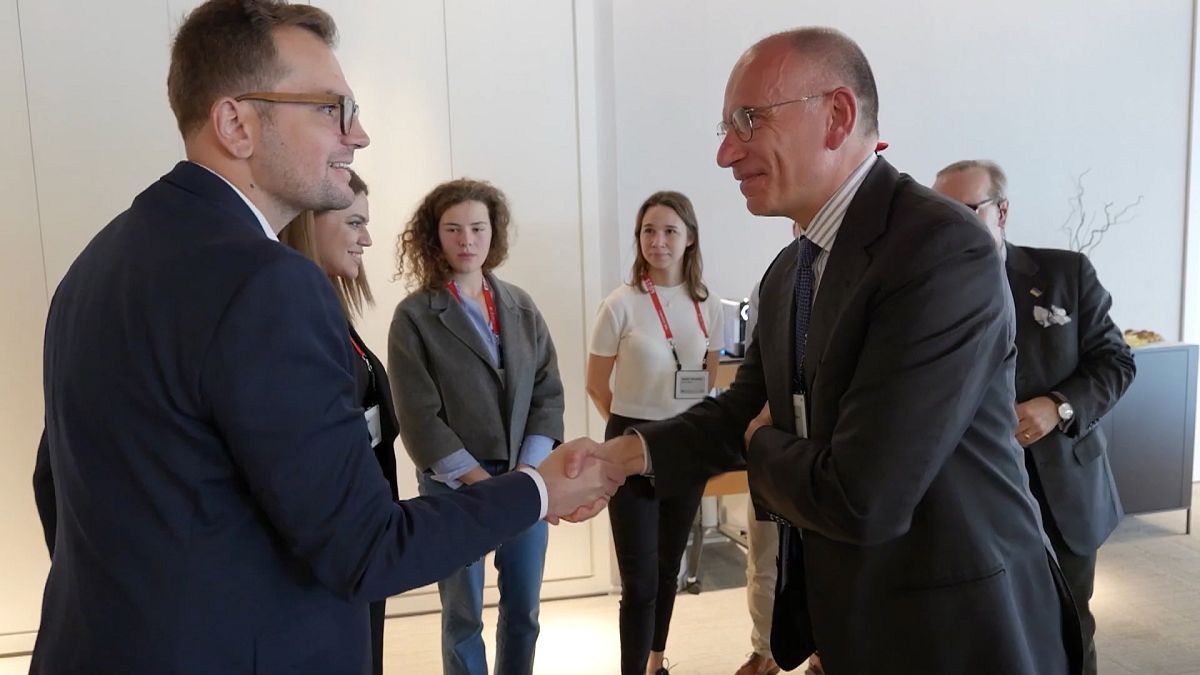The EU’s single market is based on free movement of goods, services, capital and people. Ex Italian PM and author of a report into the single market, Enrico Letta argues a 5th freedom – encompassing research, education and innovation – is vital for Europe’s future prosperity.
“I start from a very red, strong red alarm, a big red alarm. The gap is growing with the US.” The alarm that Enrico Letta so vividly envisages is the wake-up call he believes the European Union needs in order to see that the single market is in critical need of development in order to keep with rivals such as the USA and China, and to adapt to global geopolitical developments over the past three decades.
The former Italian prime minister and academic has just compiled a report commissioned by the Belgian presidency of the EU on the future of the single market. It was created 31 years ago in a move that turbocharged the integration of the bloc’s internal economy. The gist of his review is that this groundbreaking innovation needs to take another leap forward.
“The single market as it is today is not enough, because it was conceived for a world that is no longer there”, he says.” His comprehensive study took six months to complete and involved a tour of 65 cities and some 400 meetings.
Limits to EU competitiveness
The single market was founded in 1993 in a very different global financial and trade environment. “When Jacques Delors launched the SM, the Soviet Union was still there, Germany wasn’t united, China and India together were 4% of world GDP,” Professor Letta says. “The big of today and tomorrow has to be bigger because the dimensions of China, of the US, the BRICs has completely changed.”
Three sectors; energy, financial services and telecoms are not part of the single market and Letta believes fragmentation in these sectors damages Europe’s competitiveness: “We are having 100 telecom operators in Europe, fragmented in each country 3, 4, 5 operators,” he adds. “In the US there are 3, in China each operator has more than 467 million clients.”
Worse still for Letta is the lack of integration in financial services. “Our 27 financial markets are not enough integrated, not enough attractive, they are too small and the American market is having this pull effect.”
Meeting Europe’s big goals
The veteran Italian centre-left politician suggests creating a savings and investment union, which he describes as a pillar of private money. Combined with public funds, it would pay for Europe’s flagship net zero policy. However, the financing is a divisive subject. “We continue not answering the question on how to finance the transition,” Letta says. “Farmers will be the first in a long sequence of people protesting, next one will be the workers in the automotive industry, next you will have other workers, other business people, other citizens.”
Many entrepreneurs say the single market isn’t working for them. While big companies have the money and staff to operate in countries with different legal regimes, smaller firms don’t. Letta aims to simplify this: “The idea is starting from the legal environment is to create a masterkey a sort of passepartout, one legal system, a 28th legal system that is a sort of another European country, a virtual country, with his own legal system.”
Business Planet asked the head of small tech firms lobby DigitalSME if he thought this would help. Sebastiano Toffaletti, Secretary General of the European Digital SME Alliance was very postive about the idea. “I think it is a brilliant idea,” he enthused. “If I have to set up a company I will have to set it up in my country, I’m Italian, I will set it up in Italy, but if I want to do business let’s France, Poland or elsewhere, I have to set another company in those countries so this is a complete mess.”
Towards a fifth freedom
The 4 pillars of the European single market are freedom of movement for goods, services, capital and people. Letta acknowledges this is a very 20th century view and says a 5th freedom – for innovation, research and education – is desperately needed.
“Having [had] meetings around Europe, many young people, start-uppers [were] telling me ‘we want to go and do the US, Europe is not the place where we can develop our ideas’.’
An example of the potential for development of the single market can be found in the domain of medical research. Allowing free acress to articles and their data is already helping accelerate European health breakthroughs, as Business Planet discovered via the French public research body, INSERM (Institut national de la santé et de la recherche médicale).
“We now regularly see publications of articles based on the use of a dataset generated by another laboratory, possibly in another country. And I think that’s fantastic,” aid Isabelle Chemin, INSERM’s research director. “It avoids maybe ten labs all doing the same thing again, which costs a lot of money,” she added.
Research centres such as INSERM are vital for an innovative, competitive Europe and a next generation single market is essential to allow this sector, and others, to fulfil their potential. It may become a reality of EU leaders share Enrico Letta’s vision.

